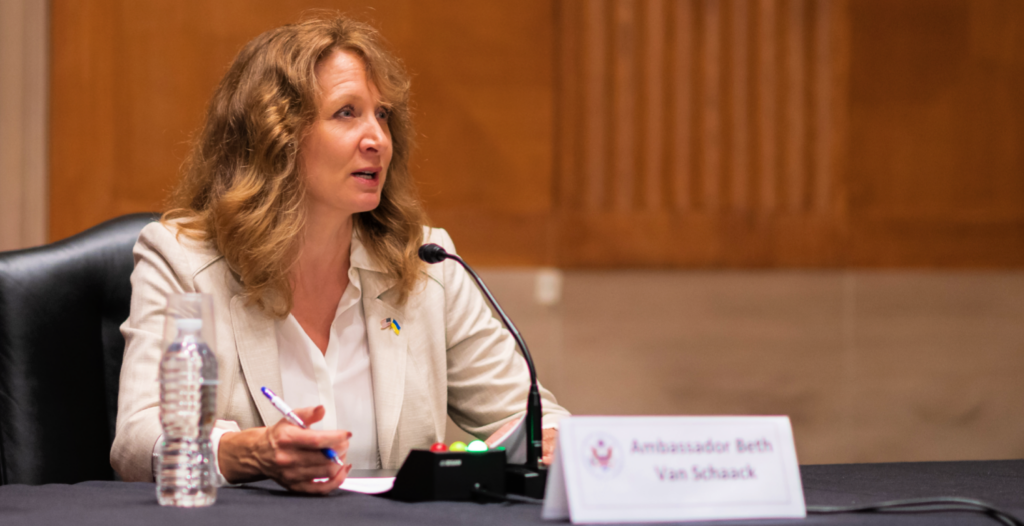Mr. Speaker, next week following the NATO conference in Prague, President Bush is scheduled to meet with President Putin in St. Petersburg, Russia. It is expected that the two leaders will discuss such vital issues as the war against terrorism, the policies in Iraq, safeguards against weapons of mass destruction, and expanded energy cooperation between the United States and Russia. I would urge Mr. Bush to include on the agenda the continuing conflict in Chechnya.
At this time, the Russian Government and its people are still recovering from the horrific events of last month, when a group of armed Chechen terrorists seized approximately 700 hostages in a Moscow theater and threatened them with execution if the Putin Administration did not withdraw its forces from Chechnya. After three days of terror, Russian special forces captured the theater, apparently killing all the terrorists. In the preliminary gas attack to neutralize the terrorists, over one hundred hostages lost their lives. This terrorist attack was appropriately condemned by the Bush Administration, and we all sympathize with the innocent victims of this attack.
But Mr. Speaker, this does not mean that we should not step back and seriously examine the circumstances that have driven some elements of the Chechen resistance to such suicidal extremes.
Perhaps it is because the Russian military, in its drive to suppress Chechen separatism, has employed means which virtually guaranteed to drive a despairing civilian population into the arms of a radicalized resistance. In the three and a half years since the war reignited when Chechen militants invaded neighboring Dagestan, the Russian military has embarked on a campaign of carnage, destruction, and looting against the civilian population. There are credible and ongoing reports of atrocities committed by members of the Russian military – indiscriminate shelling and bombing, murder, assault, rape, torture, arrests and “disappearances,” kidnaping and holding civilians for ransom. It is imperative that military personnel who commit such egregious human rights violations face criminal charges but the Russian military and judicial system has yet to demonstrate its commitment to bring such criminal actions to account.
Nor should we have any illusions about some elements among the Chechen fighters, who have murdered hostages, kidnapped civilians for ransom and used them as shields during combat operations, and embarked on a campaign of assassination against fellow Chechens who work for the Russian civil government in Chechnya. And, as Deputy Assistant Secretary of State Steve Pifer testified before the Helsinki Commission, “We have seen evidence of individuals or certain factions in Chechnya who are linked to international terrorist elements, including Al Qaeda.” Without a doubt, war criminals and terrorists should be brought to justice, wherever they are and whomever they serve.
In the wake of the attack on the theater in Moscow, President Putin has hardened an already uncompromising position against the Chechen fighters. But, it should be clear that the Russian scorched-earth policy against Chechnya and the Chechen people is not bringing peace to the region. Rather, such policies are sowing the dragon’s teeth of hatred and conflict for generations to come.
The distinguished Newsweek commentator Fareed Zakaria recently wrote:
Terrorism is bad, but those fighting terror can be very nasty, too. And the manner in which they fight can make things much, much worse. It is a lesson we had better learn fast because from Egypt to Pakistan to Indonesia, governments around the world are heightening their repression and then selling it to Washington as part of the war on terror. Russian officials called the Chechen fighters “rebels” or “bandits” until recently. Now they are all “international Islamic terrorists.”
Secretary of State Colin Powell continues to call for the observation of human rights and a political settlement in Chechnya, while consistently and properly supporting Russia’s territorial integrity. But as the Danish Foreign Minister, Anders Fogh Rasmussen, recently summed up the issue, “We, of course, support Russia in the fight against terrorism … but it is not a long-term solution to the Chechnya problem to launch a military action and bomb the country to pieces.”
In addition, the war in Chechnya has affected thousands of refugees, who have fled the constant carnage. In September of this year, I and 10 other colleagues from both the House and Senate wrote President Putin regarding the plight of the internally displaced persons escaping Chechnya to the neighboring province of Ingushetia. We urged the president to resist the forcible return of internally displaced persons seeking refuge in Ingushetia, elsewhere in the Russian Federation, or to any location where the security situation is unstable and proper housing unavailable. However, I have recently learned of 300 Chechen families who are currently facing expulsion from Ingushetia and are seeking refugee status in Kazakhstan. I hope the Russian Government will not expel these individuals, but instead will take all possible actions to alleviate the situation for the many innocent victims of the brutal violence.
Mr. Speaker, I strongly urge President Bush to include these important issues in his talks with President Putin when they meet in St. Petersburg.





